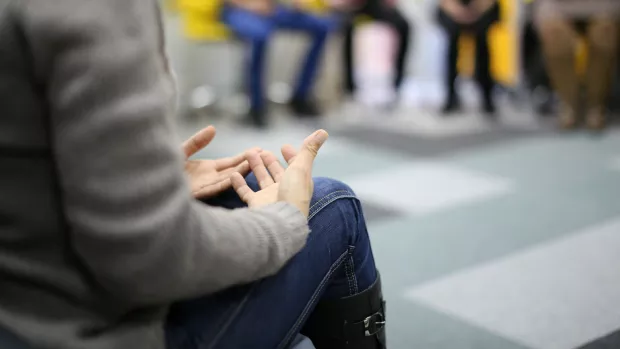
A bright future for cognitive rehabilitation?
We spoke to Lauren Taylor, a Clinical Psychology PhD student at the University of Nottingham, about her research into cognitive rehabilitation, and the NEuRoMS study.
Can you explain what cognitive rehabilitation is?
It’s a specialised form of neuropsychological intervention. It focuses on giving people knowledge and information about their cognitive problems – like memory and thinking.
We talk to people about how MS has affected their cognition, and what’s causing it. We offer reassurance and we focus on teaching different ways to help manage these symptoms. Like mnemonic devices – these can be rhymes or acronyms that can help remember things.
We advise using physical aids too, like using a diary, iPad or Alexa. And we talk about how people can use these to help with the symptoms they're struggling with the most.
Does research show cognitive rehabilitation works?
There’s good evidence to support cognitive rehabilitation. We reviewed 44 studies across the world and found it improved memory and quality of life in the long-term.
We’re also carrying out our own trials at Nottingham. The CRAMMS trial compared 10 sessions of group cognitive rehabilitation to usual clinical care. It showed a reduction in everyday memory problems and an improvement in mood for up to 12 months.
But it’s not so cut and dry. I’ve looked into the data further and it shows certain people might respond better to rehabilitation than others.
Studies have shown that invisible symptoms, like cognitive issues, can cause more distress than physical symptoms in some people.

Is this where your new trial fits in?
Yes! I’ll be running a 10-week group intervention based on the CRAMMS trial, but it’ll be online. I've had people contact me all the way from Glasgow to London who want to take part. So it has the potential to allow people to access services who couldn’t before.
The trial has two objectives – firstly we want to see if it’s possible to deliver this programme online. And secondly, we want to see whether we can use an algorithm to predict who is most likely to benefit from the sessions. This means we can make more personalised recommendations.
Are there some cognitive rehabilitation services people can already access?
Unfortunately there’s not a lot outside of research trials. You might get a referral to a psychologist if your symptoms are severe. But people with mild to moderate issues slip through the net.
Studies have shown that invisible symptoms, like cognitive issues, can cause more distress than physical symptoms in some people. They can be really frightening. So we need to see more being delivered.
What do you think the future of cognitive rehabilitation looks like?
I think things will change soon. It’s come to a point where we can’t deny the evidence or the importance of cognitive symptoms.
Now we really need to focus on ways to get rehabilitation into clinical practice. To do that, we need a programme that combats the issues with lack of staff, resources, and funding in the NHS.
We hope the result of the NEuRoMS project will be the answer. We’re already carrying out cognitive screening in three NHS trusts. And we’ve developed a rehabilitation manual we’re testing in trials. We could use this to train existing healthcare providers like nurses to deliver it face-to-face and online.
If successful, we hope it’s something that could be rolled out nationally so everyone with MS could access it.
Find out more
- Lauren’s trial is part of her PhD research. It's recruiting people with MS between the ages of 18 and 70 who’ve been diagnosed more than three months ago. Recruitment is open until the end of March 2023. To find out more, contact our MS Helpline by emailing [email protected] or calling on 0808 800 8000
- Lauren is also part of the NEuRoMS project, which hopes to change how cognitive MS symptoms are managed. This is different to the trial she's recruiting for. Read more about the NEuRoMS project.
- This article originally featured in MS Matters.


